
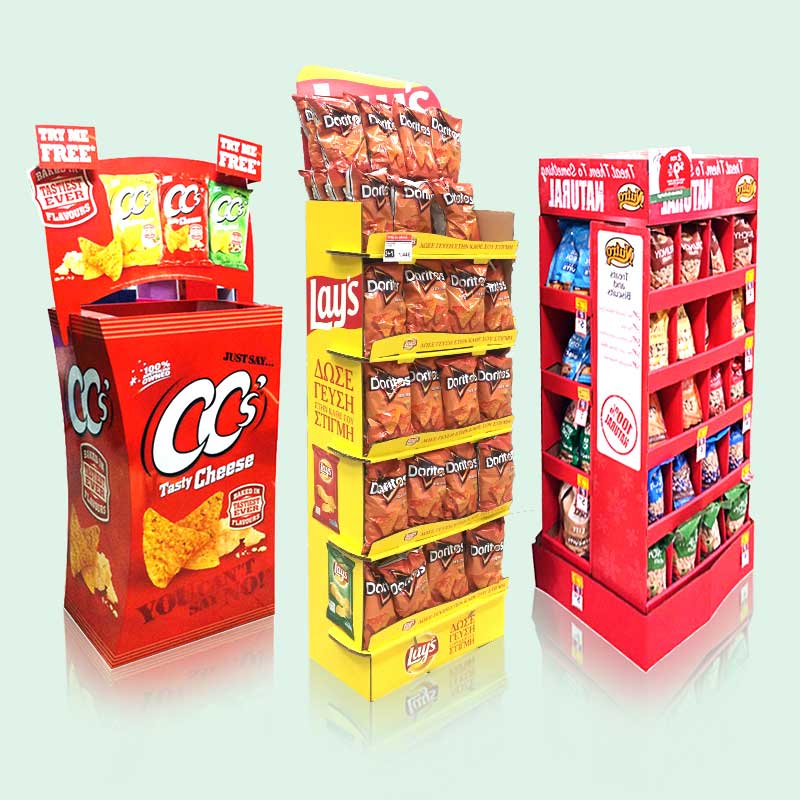
If you sell snacks in a store, at a trade show, or in a pop-up booth, snack cardboard displays are one of the simplest tools you can use to get more people to actually pick something up and buy it.
When I say snack cardboard displays, I mean those freestanding or countertop stands, dump bins, pallet displays, and branded boxes made from corrugated cardboard that hold chips, candy, protein bars, nuts, and other grab-and-go products. They sit in high-traffic spots and quietly do the job of a sales assistant:
Studies on in-store displays show that when you move snacks out of regular shelves and into well-designed displays, you can significantly increase impulse purchases and total sales.
In this guide, I’ll walk you through:
I’ll keep it practical, so you can read this and immediately get ideas for your next rollout or campaign.
Let’s start with a simple definition.
Snack cardboard displays are temporary or semi-permanent structures made from cardboard that present snacks in a focused, branded way. They’re a type of POP display, which means Point-of-Purchase display – any unit placed where customers decide what to buy, usually inside the store rather than outside.
Why cardboard?
Because of this mix of low cost and high flexibility, snack cardboard displays are popular in:
Think of them as physical “ads” that also hold product.
There isn’t just one style. Different snack cardboard displays work better in different places. Let’s break down the main types you’re likely to use.
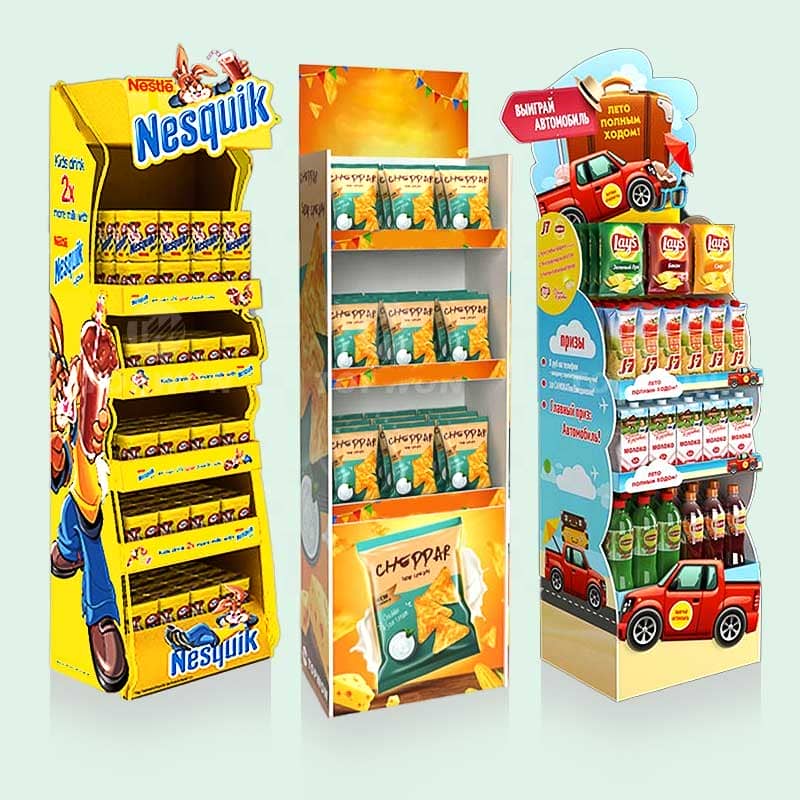
Floor displays are tall, freestanding structures you place in the aisle, at the end of a gondola, or near the entrance.
They usually have:
Why floor displays work
If you and I walk into a supermarket and see a bold, full-color stand loaded with chips in a new flavor, it feels special compared to a few bags squeezed into the snack aisle.
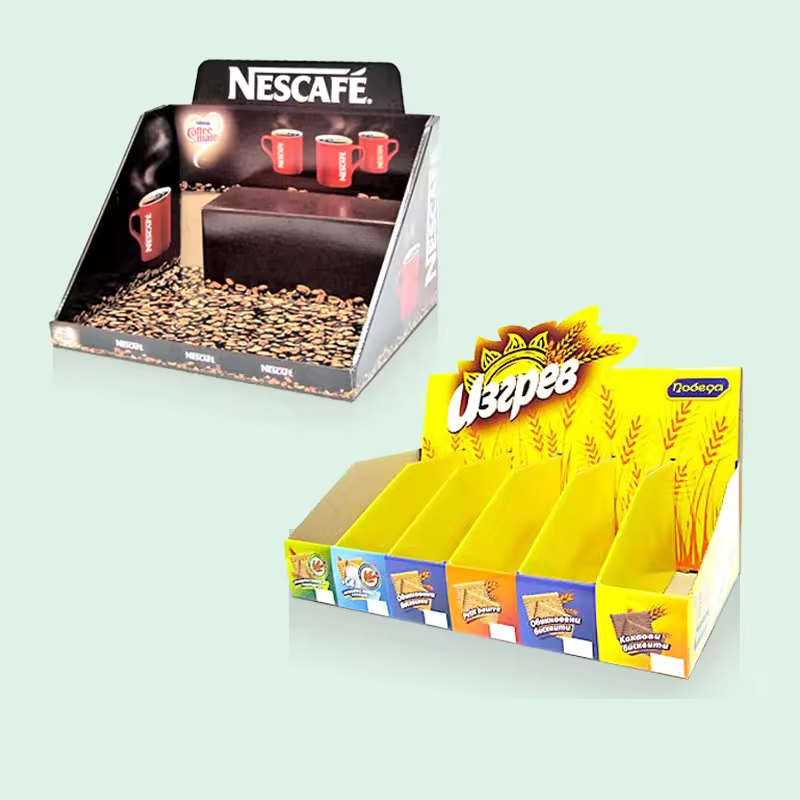
Counter displays are small units that sit on checkout counters, service desks, or coffee bars.
They’re designed for impulse buying – quick, low-risk purchases people add at the last second.
Typical products here:
Why counter displays are powerful
If you run a small store or café, a few well-chosen counter displays can make a surprising difference in daily revenue.
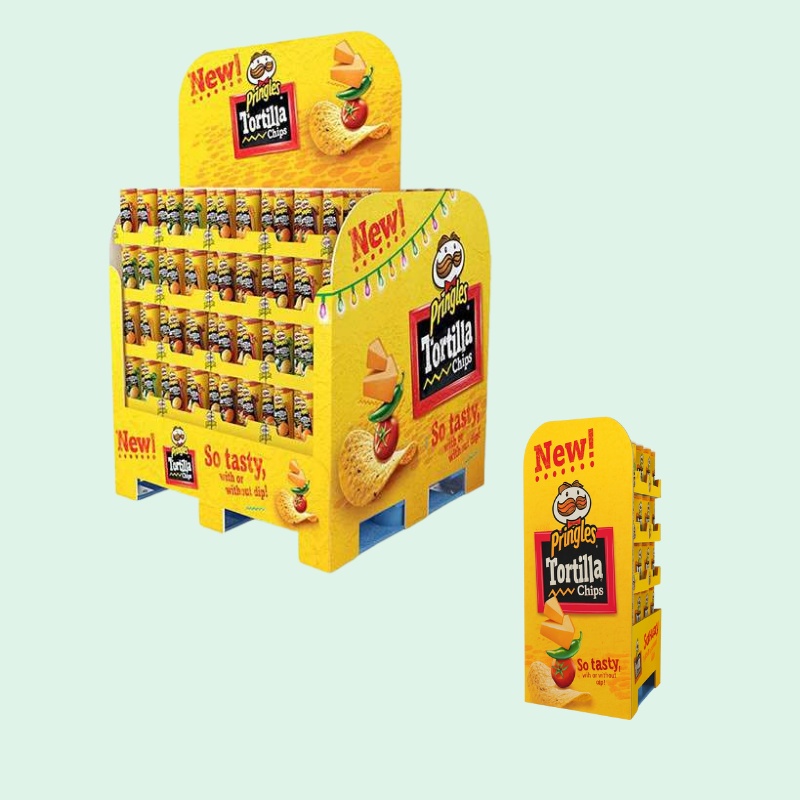
Pallet displays sit on a full or half pallet and are common in big retail chains and club stores.
Sometimes they’re pre-packed at the factory, wrapped, and shipped “ready-to-sell” so store staff only need to cut the wrap and roll it into position.
Why brands love pallet-style snack cardboard displays:
If your snack line includes big family packs or multipacks, pallet displays are often the best way to show them.
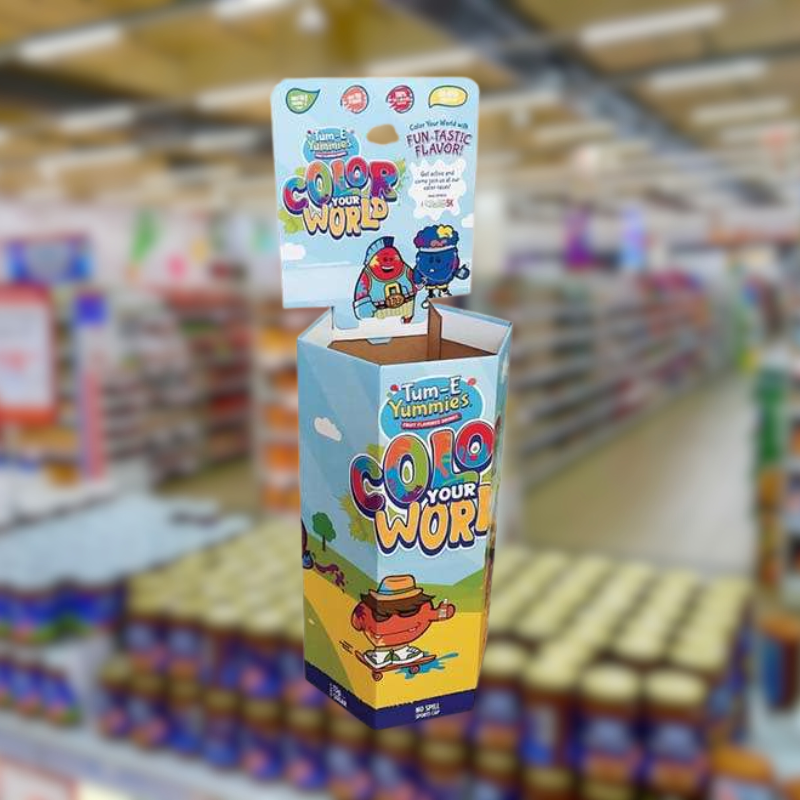
A dump bin is an open bin or box where snacks are literally “dumped” in a loose way.
It looks a bit messy on purpose.
Why? Because that “treasure hunt” feeling can trigger bargain-hunter behavior. Customers dig around, feel like they’re discovering deals, and often end up grabbing more than they planned.
Dump bins work well for:
The key is to keep the bin from looking too messy or empty. An over-stuffed bin can look chaotic, and an almost empty one looks abandoned.
For trade shows, festivals, and food fairs, brands often use event-focused snack cardboard displays. These might be:
At events, you need to stand out in a crowded hall. Cardboard displays help because:
If you attend food trade shows, having a clean, well-branded snack cardboard display system makes your booth look more professional and more inviting.
Not all displays are “just cardboard” anymore.
Some brands combine snack cardboard displays with digital screens, tablets, or projected content.
This can be as simple as:
Digital elements help when:
Now let’s talk about design.
A nice mockup on a screen is one thing.
A real unit standing in a busy store is another.
To make snack cardboard displays work in real life, you and your team need to think about both structure and visuals.
Before you design anything, ask a few simple questions:
New launch?
Seasonal promotion?
Everyday visibility?
Try a new flavor?
Trade up to a bigger pack?
Add one more item at checkout?
Near the entrance?
In the snack aisle?
At the counter?
At an event booth?
This might sound basic, but it’s easy to skip. When the goal is fuzzy, the design usually ends up fuzzy too.
Structural design means how the display is built: the shape, the supports, the way the shelves slot together.
For snack cardboard displays, structure needs to:
Many brands run load-bearing tests and basic stress tests on sample units to check that shelves don’t bow and joint areas don’t tear when fully stocked.
If you’re working with a display supplier, ask them for:
Simple usually beats complicated.
A display that can be built in 5 minutes without tools is far more likely to be used correctly in real stores.
Visual design is everything shoppers see:
Research shows that consistent use of brand colors and simple, strong visuals help customers find and remember products more easily.
Here’s a practical framework you can use:
1. One clear hero message
At the top, have one short line that answers:
“Why should I care?”
Examples:
2. Clean product photography
Show the actual pack and, if possible, the snack itself. People want to see:
3. Smart color choices
Match your brand, but also think about the store:
4. Readable from a distance
At least:
If I squint at the display from 3–5 meters away and still get the main message, it’s probably strong enough.
Design isn’t just about shoppers. It’s also about staff.
A good snack cardboard display is:
In retail environments where labor is tight, complex displays often end up mis-built or half-empty. Simple designs that “just work” get better compliance and better sales.
Think about details like:
When you do your first pilot, listen to staff feedback. They see what really happens during busy hours.
Snack cardboard displays don’t live on their own.
They’re part of your broader marketing plan, both in stores and at events.
Here are some practical ways to plug displays into your in-store marketing:
1. Place displays where people naturally pause
Research on in-store displays shows that locations like entrances, aisle ends, and main walkways drive more attention and interaction.
Good spots:
2. Use them to tell a simple story
Examples:
3. Tie in price promotions
You can use snack cardboard displays to highlight:
Clear, large price communication helps reduce hesitation and triggers action.
4. Cross-merchandise
Put snacks in displays near products that match:
This feels natural to shoppers and increases basket size.
At events, snack cardboard displays help you do three things:
You can:
Live elements like short demos, tasting sessions, or small games around the display make people stop and give you time to talk.
If you want to go a bit deeper, you can treat displays as mini “labs”.
Some ideas:
Retailers and brands that keep testing and adjusting their displays based on real data see more stable improvements over time, not just during one promotion.
You don’t always need fancy tech. Even simple store audits and sales comparisons before and after a display rollout can tell you a lot.
Let’s recap the main reasons snack cardboard displays are such a common tool in retail and events.
Cardboard is relatively cheap.
Compared with metal racks or custom wooden fixtures, you can:
This is especially helpful for smaller brands or for short-term promotions.
Because displays are light, you can:
This flexibility means you’re not locked into one layout. If a display works better near the entrance than in the back aisle, staff can simply roll or carry it over.
Snack cardboard displays can be fully printed with:
Consistent branding across packaging, displays, and digital channels helps shoppers recognize you faster and remember you longer.
You can also create:
A big part of snack sales is impulse.
When you move products from crowded shelves into focused, well-positioned snack cardboard displays, you:
Research on in-store displays shows that eye-level and checkout placements are particularly effective at driving unplanned purchases, especially for small, affordable items like snacks.
Snack cardboard displays are at home in:
You might use the same basic structure with different prints:
That keeps your in-store presence fresh without starting from zero every time.
Many snack cardboard displays are made from recyclable or recycled board.
When combined with water-based inks and minimal plastic lamination, they can be a more sustainable alternative to plastic or metal fixtures.
Eco-conscious shoppers notice this.
If your brand has strong sustainability messaging, aligning displays with that promise helps reinforce credibility. Just make sure you’re honest about what’s actually recyclable in the local context, so it doesn’t feel like greenwashing.
Of course, snack cardboard displays aren’t perfect. Let’s look at the main problems and how you can reduce them.
Cardboard can get:
Heavy packs, frequent restocking, or rough handling during shipping can damage weak points like shelf edges and joints.
What you can do:
Clients often say, “We want it eco-friendly, but we also want it cheap.”
This can be tricky.
Recycled or certified board, eco-friendly inks, and plastic-free finishes may cost a bit more. If price pressure is very high, brands sometimes slip back into less sustainable options, which can confuse customers who expect greener choices.
My suggestion:
Snack cardboard displays often use psychological triggers like:
These tools can work, but if you use them too aggressively or without real backing, shoppers may stop trusting you.
Aim for honest triggers:
Also, keep the message simple, but not empty. If the display only shouts “New! Amazing! Best!” without saying why, it can feel like noise.
In some supermarkets, everywhere you look there’s another display shouting for attention.
This display overload can make it hard for any one unit to stand out.
Ways to stand out without shouting:
Even the best design fails if:
A common headache is poor communication between brand, display supplier, and retailer about dimensions and setup. That leads to rework and wasted cost.
To reduce this:
The world of snacks is changing, and displays are changing with it.
More people are looking for snacks that feel “better for me” – higher protein, less sugar, more natural ingredients, plant-based options.
Snack cardboard displays will reflect that by:
If you work with health-focused snacks, your display should look different from a pure candy island.
Snacks with global flavors – think Korean spices, Mexican chili-lime, Japanese matcha – are growing more common. At the same time, local origin stories still matter.
Snack cardboard displays can:
Retail display trends point toward:
Cardboard is naturally well-placed here. You can:
Looking ahead, we’re likely to see more tech around snack cardboard displays:
You don’t need to do everything at once. But even simple steps like QR codes for recipe ideas or loyalty sign-ups can make your display do more than just hold product.
Retailers and brands want flexibility.
Instead of one rigid design, many are moving toward modular snack cardboard displays where:
This helps you reuse base structures while updating the look for each season or retailer.
A simple checklist for your next snack cardboard display
To wrap up, here’s a practical checklist you can use the next time you plan snack cardboard displays for stores or events.
1. Objective
2. Structure
3. Visuals
4. Shopper experience
5. Operations
6. Sustainability
If you walk through this checklist and adjust based on what you learn in real stores, your snack cardboard displays will get better with each rollout.
They’re not just pieces of printed board.
They’re quiet, hard-working sales tools.
And when you design them with intention, they can make a real, measurable difference to how many snacks customers pick up, try, and come back to buy again.
Links